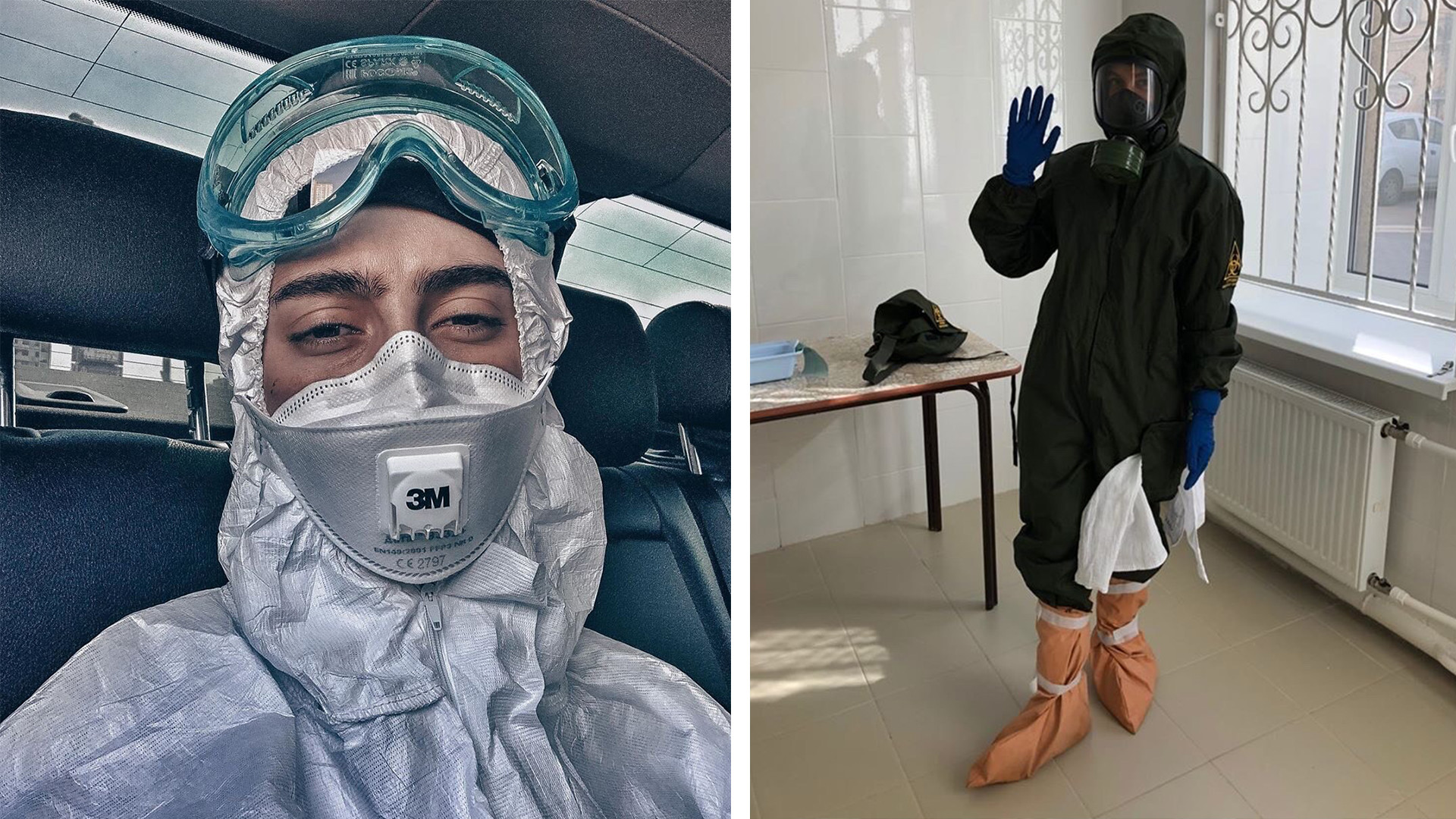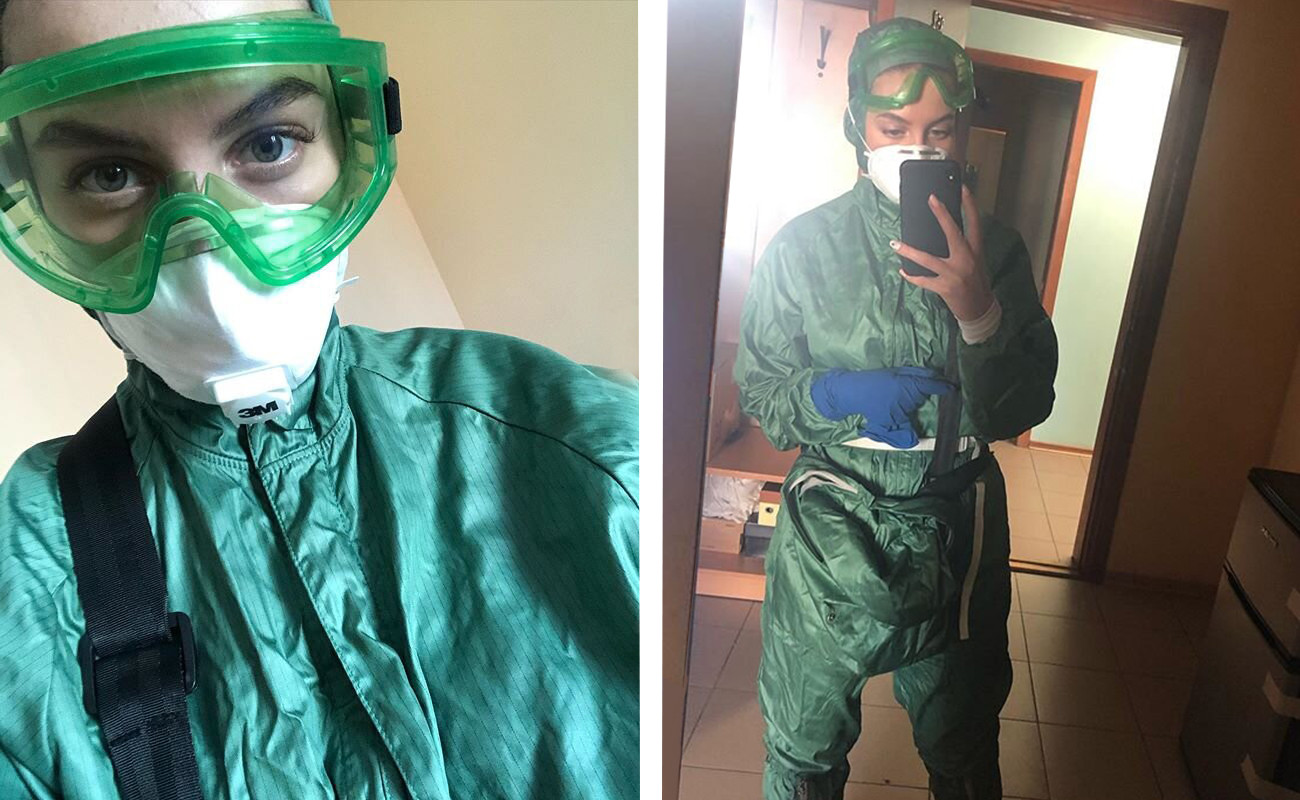How are Russian doctors coping with the coronavirus crisis?

Svetlana, general practitioner in a hospital
They sent me and other doctors to Sheremetyevo to check people arriving from abroad. We did 12-hour, sometimes 24-hour shifts at the airport, plus I was doing my main shifts in the hospital.
When international flights were still running, we were checking passengers from China — mainly students returning after the holidays. We measured their temperature onboard the plane. Then they went through passport and border control and into the medical zone, where we photographed them, took smears, assigned each an ID code, and asked them to fill out a form giving contact details, flight number, and boarding pass number.
We gave each of them a booklet on what to do in case of symptoms, told them to self-isolate, and let them go home.
At first, there lots of passengers on the flights — 200-300 each. At night we processed 3-5 such flights, even more during the day.
As for arrivals from Italy, we just took their photo and asked them to fill out forms — we didn’t take any smears. The planes from Italy were empty, so it wasn’t difficult to cope [the first coronavirus patient in Russia was a returnee from Italy — Ed.].
But then people began returning en masse from Germany, Spain, and France. There were lots of flights, and all the planes were crammed with people.
People were tired, nervous, with children, and it was all happening at 3 or 4 a.m. You couldn’t rest for a second or take a sip of water — in the zone for potentially infected persons this was forbidden. On top of that, it was stiflingly hot in the PPE suits, and difficult to breathe through the mask.
You can’t just go to the toilet either — you have to take off your suit, leave the inspection zone, disinfect your hands, and only then go to the toilet. It was such a hassle that I just preferred to hang on till after my shift.
After processing all the main flights, we were sent back from the airport to the hospital, but by this time Moscow had introduced gone into lockdown.
We stopped hospitalizing pneumonia patients — they were sent to special departments at other hospitals. All scheduled appointments were also canceled, only emergency patients were received. Almost everyone is being tested for coronavirus — all, fortunately, negative so far.
But the situation in the hospital is getting tenser. Both doctors and patients are starting to panic, no one knows what to expect.
Patients are terrified of contracting coronavirus, and tell the doctors that their fever or dry cough is just a cold. Some kick up a stink and need a lot of persuading to go into the isolation ward.
The doctors are also on edge. We all understand that coronavirus is poorly understood. You never know where or how you might get infected.
I see 80–200 people per shift, after which I go straight home to bed. All the same, I love my job. The only thing I fear is catching the virus myself and not being able to help the sick. I hope it all ends soon.
Svetlana, general practitioner in a hospital
My working day is a nightmare. For two weeks now I’ve had twice as many patients, about 40-50 people per shift, because we don’t have enough doctors. One couldn’t stand the stress and resigned mid-pandemic, another went on maternity leave. So we’re down to two physicians per 10,000 people.
We also provide emergency care, but it can’t handle the number of complaints, so since April 1 I’ve been doing ambulance callouts. Our stockpiles of medicines for the most common diseases, such as acute respiratory viral infection, help cope more or less with the flow of patients.
The most common request from patients is for a coronavirus test. There’s a lot of panic especially among young people. However, we’re allowed to test only patients with pneumonia or who have flown in from abroad or been in contact with someone who has. We explain that this is now the law, and, if they are worried, they can pay for a private test.
Recently, I’ve been drinking a bottle of wine after each shift. I know it’s bad, but right now it’s the only way to deal with the stress.
Alexandra, epidemiologist at a St Petersburg disinfection station
We do disinfection. Whenever there’s a flashpoint of any infectious disease, Rospotrebnadzor [the Federal Service for Wellbeing] orders us in. It’s our job to determine the boundaries of the hotspot, and control the treatment process.
It all started at Severnaya hostel. There was a student there who’d contracted coronavirus in Italy. After the patient was evacuated, four or five teams went to the hostel and disinfected the entire building. We also took all the patient’s clothes, blankets, mattresses, bedding, and towels. Everything that had been in contact with the patient was cleaned at 60C in special disinfection chambers. Returning home that day, I collapsed on my bed.
After the disinfection, all the students were quarantined for two weeks, and after the quarantine, another six teams went to check that the infection was gone.
Now there’s a lot of work because of all the confirmed cases of coronavirus. The teams are generally made up of doctors, as well as bacteriologists and microbiologists. There aren’t enough people, and the area of infection is increasing. At any time, day or night, they can call us out to another hot zone. It’s exhausting. Previously we offered private disinfection services — now all orders are suspended.
Rano Amirbekova, general practitioner
Russian outpatient clinics are now setting up special ambulance teams. We are catastrophically short of doctors, in particular general practitioners. So at the moment, callouts for general medical conditions might be handled by rheumatologists, surgeons, and neurologists. While primary care doctors, such as myself, are being deployed in the fight against COVID-19 — we go to the homes of suspected coronavirus patients, or those already sick.
I started this, for me, new job on March 27, and have done three shifts so far. But even this short period has changed my attitude towards the profession and people in general.
My working day begins at 8 a.m. and ends at 8 p.m. if I’m lucky, but that’s only when I’m on call — after that there’s lots of paperwork and documentation of cases to do.
We work in 2-2 or 2-1 shifts [two days on, two/one off], but even on “days off” we still have to do paperwork. In general, I’m a primary care physician, so I look after entire families. The worst-case patients have my number, we’re always in touch, sometimes I give online consultations.
Coping with the flow of patients in the current environment is really tough, because you have to manage to see all patients in one shift: it might 16 or 34, you never know. The coronavirus teams have been issued cars with drivers, plus a police officer rides with us.
Sometimes people react strangely. Everyone we deal with wants to know immediately if we’ve “found coronavirus” or wants to take a selfie with us in the car — I can’t count how many times that happened in just three shifts. Some patients don’t believe in coronavirus at all and don’t want to be tested. They say it’s all a government conspiracy; we have to convince them of the opposite.
Due to the special working regime, you can’t even use normal face cream, and my unkempt eyebrows have seen better days, but you mustn’t touch your face while on duty. After 12 hours of wearing a mask, your face feels alien. I try to ignore the discomfort and just do my job.
The only life hack we use is: carefulness saves time. The main thing is to stay focused. It’s just you and the patient. The more careful and detailed your questions, the faster and more accurately you can assess their risk group. If you think you can get away with muttering a few generalities, you’ll end up doubling the workload.
My motivation is the people themselves. Yesterday I was called out to a patient who’d flown back from Indonesia. At the end of the checkup, he said: “Thank you, doctor. We really appreciate you.” It was, if I’m not mistaken, my 28th callout that day, and I was out on my feet, hoping that this coronavirus thing was a nightmare I’d wake up from. But after his words, I was ready to examine another 30 patients.
I really hope that after the crisis people in Russia will reconsider their attitude to doctors and health care in general, and start to appreciate the true value of what we do.
If using any of Russia Beyond's content, partly or in full, always provide an active hyperlink to the original material.
Subscribe
to our newsletter!
Get the week's best stories straight to your inbox
